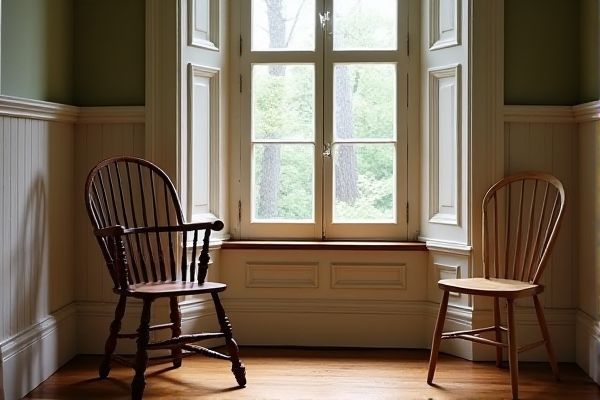
Windsor chairs feature a solid, sculpted seat with slender, turned legs and a curved back supported by multiple spindles, offering both comfort and classic elegance. Discover how these design elements compare to spindle-back chairs and which style fits your home decor by reading on.
Table of Comparison
| Feature | Windsor Chair | Spindle-Back Chair |
|---|---|---|
| Design Origin | 18th-century England | Traditional design, varies by region |
| Backrest | Curved back with multiple spindles | Straight or slightly curved back with vertical spindles |
| Seat | Shaped solid wood, often contoured | Flat or slightly curved wooden seat |
| Legs | Splayed legs angled outward for stability | Straight or slightly angled legs |
| Comfort | Ergonomic with supportive back | Simple support, less ergonomic |
| Use | Dining rooms, classic interiors | General seating, casual interiors |
| Materials | Hardwoods like oak or maple | Various woods, often softer varieties |
| Appearance | Elegant, refined craftsmanship | Rustic, simple silhouette |
Introduction to Windsor and Spindle-Back Chairs
Windsor chairs feature a solid wooden seat with multiple turned spindles forming the backrest, offering sturdy support and classic design favored since the 18th century. Spindle-back chairs, while similar, emphasize vertical spindle arrangements that create a lighter, more delicate appearance suited for various interior styles. Your choice between the two depends on the desired balance of robust construction and aesthetic refinement.
Historical Origins and Evolution
Windsor chairs, originating in early 18th century England, are characterized by a solid wooden seat with turned spindles forming the backrest and often the armrests, reflecting craftsmanship of the colonial period. Spindle-back chairs, a broader category, include various designs where vertical spindles support the back, evolving across different cultures but maintaining the emphasis on spindle construction for durability and ventilation. Both chair styles exhibit a rich evolution from functional seating in workshops and homes to iconic furniture pieces valued for their blend of ergonomics and traditional woodworking techniques.
Key Design Differences
Windsor chairs feature a solid wooden seat with turned legs splayed outward and a curved backrest composed of multiple spindles inserted into a sculpted seat, providing stability and classic style. Spindle-back chairs typically have a more straightforward design with vertical spindle elements forming the backrest, often set into a separate frame rather than directly into the seat. Key design differences include the Windsor chair's integrated seat-back-leg construction and splayed legs versus the spindle-back chair's simpler, frame-based backrest and leg alignment.
Construction Techniques and Materials
Windsor chairs are traditionally crafted using steam-bent wood for the curved backrest, combined with turned spindles and a solid wooden seat, often made of hardwood like oak or ash for durability. Spindle-back chairs feature multiple vertical spindle rods set into both the seat and a horizontal back rail, relying heavily on precise joinery techniques such as mortise-and-tenon to ensure structural integrity. Both styles emphasize handcrafted woodworking methods, but Windsor chairs typically use bentwood techniques while spindle-back designs prioritize straight-grain spindle arrangements for support.
Comfort and Ergonomics
Windsor chairs feature a contoured seat and angled back spindles that provide lumbar support, enhancing overall comfort for extended sitting. Spindle-back chairs typically have a straight back design with vertical spindles, offering less ergonomic support compared to Windsor chairs. Ergonomically, Windsor chairs better distribute weight and promote proper posture, making them ideal for prolonged use.
Aesthetic Appeal and Style Variations
Windsor chairs feature a classic English design with a rounded back and slender spindles that create a timeless, elegant aesthetic suitable for traditional and rustic interiors. Spindle-back chairs vary widely in their design, often showcasing tighter or more decorative spindle arrangements, which can add a more intricate or contemporary flair to your space. Choosing between these styles depends on your preference for either the Windsor's understated elegance or the spindle-back's potential for ornate, personalized accents.
Durability and Longevity
Windsor chairs are crafted from hardwoods like oak or maple, offering exceptional durability and resistance to wear, making them suitable for long-term everyday use. Spindle-back chairs, often constructed from softer woods such as pine, provide moderate longevity but may show signs of wear more quickly under heavy use. The robust joint construction and solid wood components in Windsor chairs contribute significantly to their superior lifespan compared to typical spindle-back designs.
Versatility in Home Décor
Windsor chairs offer timeless appeal with their curved backs and elegant spindles, seamlessly blending into both traditional and modern interiors. Spindle-back chairs, characterized by their straight, vertical rods, provide a minimalist look that complements contemporary and rustic styles alike. Your choice between these chairs can enhance versatility in home decor by balancing classic craftsmanship with adaptable design aesthetics.
Price and Accessibility
Windsor chairs typically range from $150 to $500, reflecting their handcrafted nature and historical craftsmanship, while spindle-back chairs often cost between $80 and $250, making them more budget-friendly and widely accessible. The availability of spindle-back chairs in numerous styles and materials allows you to find a suitable option in most furniture stores or online marketplaces. Your choice between these chairs may depend on budget constraints and preferred access to traditional versus contemporary designs.
Choosing the Right Chair for Your Space
Choosing between a Windsor chair and a spindle-back chair depends on your space's aesthetic and functional needs. Windsor chairs feature a solid wooden seat with a fan-shaped spindle back, offering sturdy support and a classic, rustic charm ideal for farmhouse or traditional decor. Spindle-back chairs, with their evenly spaced vertical spindles, provide a lighter, airier look that suits modern or minimalist interiors while maintaining comfort and durability.
 homyna.com
homyna.com